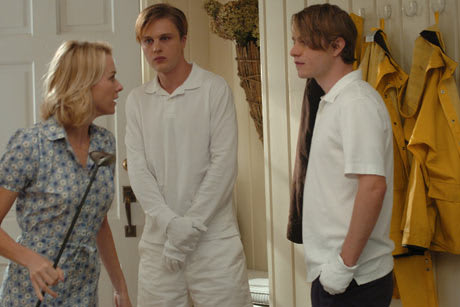A suburban family (Naomi Watts and Tim Roth, with a young son played by Devon Gearhart) get terrorised in their posh lakeside summer home by a couple of polite, sociopathic dickheads (Michael Pitt and Brady Corbet) in this unusual critique of American cinema.
From the outset, the intentions of director Michael Haneke (Cache) are clear: to inflame the audience to the point of bloodlust against the preppy pair, then deny them the satisfaction and implicate them (us) with our desire for vengeance. Through the pointed, obvious narrative, Haneke puts forth brutally violent ideas yet never shows any act of aggression. Instead, he turns away, denying us cathartic satisfaction and ideally making us feel guilty for wanting it. Late in the film, he even goes so far as to toy with our desire for narrative closure the ringleader (and director stand-in), played by Pitt, addresses the camera directly, challenging us to not fall for his ploy. And when Haneke makes a reality-shattering move late in the film, its pretty clear were being manipulated and jerked around.
That, of course, is Hanekes intent, as it was the first time he made the film in 1997. Funny Games is a shot-for-shot remake, in English, of his own movie. At the time, it caused controversy in Europe for its particularly nihilistic point of view. Here, Haneke clearly wants a similar reaction its practically begging for a mainstream American audience but instead it will remain an art-house curiosity. For all his audience baiting, Haneke isnt a brave filmmaker; his "fuck you to the audience doesnt come in the innovative forms of another famous anti-American, Lars von Trier, but rather is fluent in the language of American movies. He wants to be loved even as he slaps you in the face and calls you an ignorant cow.
The film feels particularly stage-y, and the actors are moving about on a set to which there is no real connection to the world the characters are thinly drawn, the action is painfully obvious and even the few nods to some sort of narrative momentum are just throw rugs there to be pulled out from under us later. Its not as clever as it thinks it is by half, and wont reach the audience Haneke wants to invite in for a good browbeating.
(Seville)From the outset, the intentions of director Michael Haneke (Cache) are clear: to inflame the audience to the point of bloodlust against the preppy pair, then deny them the satisfaction and implicate them (us) with our desire for vengeance. Through the pointed, obvious narrative, Haneke puts forth brutally violent ideas yet never shows any act of aggression. Instead, he turns away, denying us cathartic satisfaction and ideally making us feel guilty for wanting it. Late in the film, he even goes so far as to toy with our desire for narrative closure the ringleader (and director stand-in), played by Pitt, addresses the camera directly, challenging us to not fall for his ploy. And when Haneke makes a reality-shattering move late in the film, its pretty clear were being manipulated and jerked around.
That, of course, is Hanekes intent, as it was the first time he made the film in 1997. Funny Games is a shot-for-shot remake, in English, of his own movie. At the time, it caused controversy in Europe for its particularly nihilistic point of view. Here, Haneke clearly wants a similar reaction its practically begging for a mainstream American audience but instead it will remain an art-house curiosity. For all his audience baiting, Haneke isnt a brave filmmaker; his "fuck you to the audience doesnt come in the innovative forms of another famous anti-American, Lars von Trier, but rather is fluent in the language of American movies. He wants to be loved even as he slaps you in the face and calls you an ignorant cow.
The film feels particularly stage-y, and the actors are moving about on a set to which there is no real connection to the world the characters are thinly drawn, the action is painfully obvious and even the few nods to some sort of narrative momentum are just throw rugs there to be pulled out from under us later. Its not as clever as it thinks it is by half, and wont reach the audience Haneke wants to invite in for a good browbeating.
